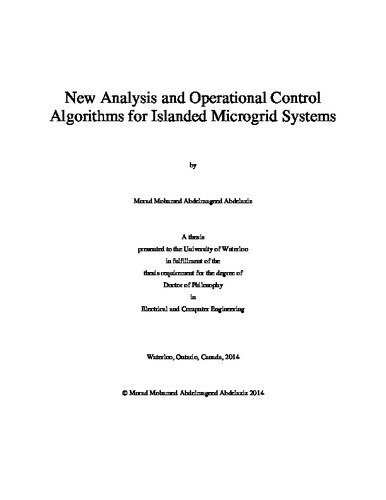| dc.description.abstract | Driven by technical, economic and environmental benefits for different stakeholders in the power industry, the electric distribution system is currently undergoing a major paradigm shift towards having an increasing portion of its growing demand supplied via distributed generation (DG) units. As the number of DG units increase; microgrids can be defined within the electric distribution system as electric regions with enough generation to meet all or most of its local demand. A microgrid should be able to operate in two modes, grid-connected or islanded. The IEEE standard 1547.4 enumerates a list of potential benefits for the islanded microgrid operation. Such benefits include: 1) improving customers’ reliability, 2) relieving electric power system overload problems, 3) resolving power quality issues, and 4) allowing for maintenance of the different power system components without interrupting customers. These benefits motivate the operation of microgrid systems in the islanded mode. However the microgrid isolation from the main grid creates special technical challenges that have to be comprehensively investigated in order to facilitate a successful implementation of the islanded microgrid concept.
Motivated by these facts, the target of this thesis is to introduce new analysis and operational control algorithms to tackle some of the challenges associated with the practical implementation of the islanded microgrid concept. In order to accomplish this target, this study is divided into four perspectives: 1) developing an accurate steady-state analysis algorithm for islanded microgrid systems, 2) maximizing the possible utilization of islanded microgrid limited generation resources, 3) allowing for the decentralized operation of islanded microgrid systems and 4) enabling the islanded microgrid operation in distribution systems with high penetration of plug-in electric vehicles (PEVs).
First for the steady-state analysis of islanded microgrid systems, a novel and generalized algorithm is proposed to provide accurate power flow analysis of islanded microgrid systems. Conventional power flow tools found in the literature are generally not suitable for the islanded microgrid operating mode. The reason is that none of these tools reflect the islanded microgrid special philosophy of operation in the absence of the utility bus. The proposed algorithm adopts the real characteristics of the islanded microgrid operation; i.e., 1) Some of the DG units are controlled using droop control methods and their generated active and reactive power are dependent on the power flow variables and cannot be pre-specified; 2) The steady-state system frequency is not constant and is considered as one of the power flow variables. The proposed algorithm is generic, where the features of distribution systems i.e. three-phase feeder models, unbalanced loads and load models have been taken in consideration. The effectiveness of the proposed algorithm, in providing accurate steady-state analysis of islanded microgrid systems, is demonstrated through several case studies.
Secondly, this thesis proposes the consideration of a system maximum loadability criterion in the optimal power flow (OPF) problem of islanded microgrid systems. Such consideration allows for an increased utilization of the islanded microgrid limited generation resources when in isolation from the utility grid. Three OPF problem formulations for islanded microgrids are proposed; 1) The OPF problem for maximum loadability assessment, 2) The OPF for maximizing the system loadability, and 3) The bi-objective OPF problem for loadability maximization and generation cost minimization. An algorithm to achieve a best compromise solution between system maximum loadability and minimum generation costs is also proposed. A detailed islanded microgrid model is adopted to reflect the islanded microgrid special features and real operational characteristics in the proposed OPF problem formulations. The importance and consequences of considering the system maximum loadability in the operational planning of islanded microgrid systems are demonstrated through comparative numerical studies.
Next, a new probabilistic algorithm for enabling the decentralized operation of islanded microgrids, including renewable resources, in the absence of a microgrid central controller (MGCC) is proposed. The proposed algorithm adopts a constraint hierarchy approach to enhance the operation of islanded microgrids by satisfying the system’s operational constraints and expanding its loading margin. The new algorithm takes into consideration the variety of possible islanded microgrid configurations that can be initiated in a distribution network (multi-microgrids), the uncertainty and variability associated with the output power of renewable DG units as well as the variability of the load, and the special operational philosophy associated with islanded microgrid systems. Simulation studies show that the proposed algorithm can facilitate the successful implementation of the islanded microgrid concept by reducing customer interruptions and enhancing the islanded microgrid loadability margins.
Finally, this research proposes a new multi-stage control scheme to enable the islanded microgrid operation in the presence of high PEVs penetration. The proposed control scheme optimally coordinates the DG units operation, the shedding of islanded microgrid power demand (during inadequate generation periods) and the PEVs charging/discharging decisions. To this end, a three-stage control scheme is formulated in order to: 1) minimize the load shedding, 2) satisfy the PEVs customers’ requirements and 3) minimize the microgrid cost of operation. The proposed control scheme takes into consideration; the variability associated with the output power of renewable DG units, the random behaviour of PEV charging and the special features of islanded microgrid systems. The simulation studies show that the proposed control scheme can enhance the operation of islanded microgrid systems in the presence of high PEVs penetration and facilitate a successful implementation of the islanded microgrid concept, under the smart grid paradigm. | en |

